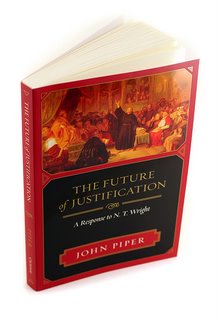 On Friday I introduced a series on John Piper’s response to N. T. Wright in The Future of Justification. We saw that to Piper the most critical difference between N. T. Wright and himself is that Wright does not believe that Christ’s righteousness is in any way transferred to our account. This is a vital, vital point. Without this concept of an alien righteousness either credited or transferred to us, ironically, both the Protestant and the Roman Catholic understandings of salvation unravel. Wright seems to believe that he and other modern theologians have discovered something that every theologian for millennia have missed. We should therefore be very careful before we accept such assertions. Men as epoch-shattering as Luther only come along very rarely. Is Wright such a man? Or is he deluded and quite plainly wrong?
On Friday I introduced a series on John Piper’s response to N. T. Wright in The Future of Justification. We saw that to Piper the most critical difference between N. T. Wright and himself is that Wright does not believe that Christ’s righteousness is in any way transferred to our account. This is a vital, vital point. Without this concept of an alien righteousness either credited or transferred to us, ironically, both the Protestant and the Roman Catholic understandings of salvation unravel. Wright seems to believe that he and other modern theologians have discovered something that every theologian for millennia have missed. We should therefore be very careful before we accept such assertions. Men as epoch-shattering as Luther only come along very rarely. Is Wright such a man? Or is he deluded and quite plainly wrong?
This is how Piper elaborates on the dilemma we finished with on Friday:
“The omniscience of the judge implies that the defendant must have a different righteousness than Wright would concede, that is, a righteousness that is more than the mere status of being acquitted, regardless of innocence or guilt. Wright stresses that for the defendant, righteousness is not a character quality (i.e., not a moral righteousness) but a status, namely, that the court has found in the defendant’s favor.
The defendant may or may not have committed the crime with which he was charged. Regardless, if the court finds in his favor, he is “righteous.” He has that status.
This definition of “righteous” may work in ordinary human law-courts where judges are fallible and their judgments must stand, whether they are right or wrong. But there’s a catch. In God’s courtroom, the Judge is omniscient and just. Now everyone in the first century would agree that in a courtroom where the Judge knows everything and is just, there can never be a case where there is a discrepancy between the truth of the charge and the truth of the verdict. In this court, what would be the basis of saying, “I bestow on you the status of righteous, and I find you guilty as charged”? How could such a finding be intelligible, not to mention just? One right answer that I think Wright would agree with is that this is what the atonement is all about. Christ died for our sins to provide a basis for this finding, and therefore, though guilty, the court can exercise clemency (or in God’s case, forgiveness) because of Christ and we go free.” (p. 74)
Piper goes on to summarize his understanding of what happens in justification in the following simple, but wonderful way:
“Wherever sins are not counted—righteousness is counted. That is, the forgiven person is not considered by God merely as a sinful forgiven person, but as a righteous person—a person “to whom God counts righteousness apart from works.” (p. 75)
Book photo courtesy Tony S. Reinke, The Shepherd’s Scrapbook. Used by permission.















